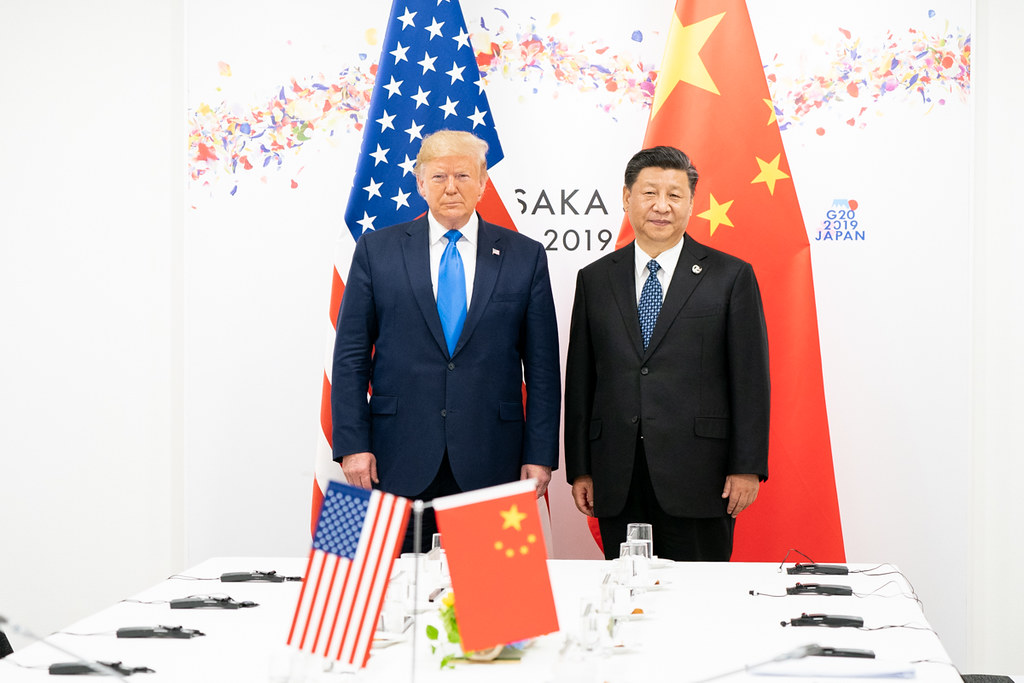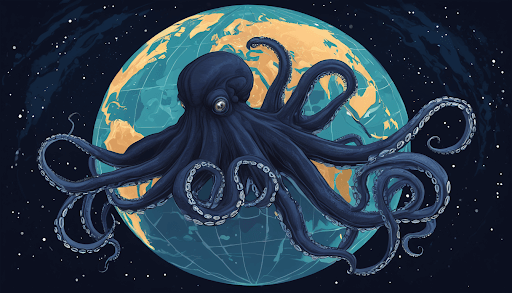U.S. and China Reach Verbal Trade Agreement; Tensions Flare Over NBA GM’s Tweet on Hong Kong
U.S. and China Reach Verbal Agreement on “Phase One” of Trade Deal, but Uncertainty Remains

Published by The Lawfare Institute
in Cooperation With

U.S. and China Reach Verbal Agreement on “Phase One” of Trade Deal, but Uncertainty Remains
After Oct. 11 negotiations in Washington, D.C, the U.S. and China reached a verbal agreement under which the U.S. will cancel an Oct. 15 increase in tariffs from 25 to 30 percent on $250 billion of Chinese imports. President Trump has stated that, in exchange, Chinese negotiators pledged to raise annual imports of U.S. agricultural goods to $40-50 billion and to purchase $16-20 billion of Boeing products—though other reports suggest China is now offering different terms. So far, the two sides have not yet signed an official deal and will continue to negotiate specific terms in the coming weeks. If a deal is reached, the U.S. may cancel 15 percent tariffs on an additional $150 billion of imported Chinese goods scheduled to take effect in December. Trump and Chinese President Xi Jinping will meet, and potentially sign an agreement, at the upcoming Asia-Pacific Economic Cooperation (APEC) Forum meeting, to be held in Chile Nov. 11-17. The Chinese side has also requested additional in-person negotiations at the end of October.
Coming out of the Oct. 11 discussion, Trump has portrayed the verbal agreement as nearly certain to produce a written deal. He has also characterized recent U.S.-China collaboration in an extremely positive light—calling the latest meeting a “love fest.” However, signs are already emerging that negotiations are more volatile than Trump represents. Chinese media, for instance, have referred to the Oct. 11 developments merely as “progress,” not a “deal.” And, since Oct. 11, China appears to be adding new preconditions. One spokesman has stated that any deal at this stage must also include a cancellation of Washington’s new December tariffs. Reports have also emerged that Chinese negotiators are demanding the rollback of some existing tariffs prior to signing and that China is now offering $20 billion of agricultural imports next year, without a hard commitment to later reaching $40-$50 billion. Some U.S. officials, too, appear less sanguine than Trump on the talks’ trajectory. Commerce Secretary Wilbur Ross this week downplayed the prospect of Trump and Xi signing an agreement at their APEC meeting, saying that the “right deal” might be signed after November.
Compounding doubts about the negotiations’ success are recent U.S. actions that have angered Beijing and risk Chinese retaliation that could derail trade talks. On Oct. 15, for instance, the House of Representatives voted in favor of a series of bills that express support for Hong Kong protestors and lay groundwork for new sanctions on the city. China harshly condemned the legislation and threatened “strong countermeasures” if the bills become law. The week before, after the U.S. placed 28 Chinese companies on a blacklist (which requires U.S. firms to obtain a license before trading with them), a spokesperson for Beijing told reporters to “stay tuned” regarding retaliatory measures. Meanwhile, some Chinese actions also risk provoking U.S leaders: On Oct. 21, China petitioned the World Trade Organization to levy sanctions against the U.S. for failing to follow previous rulings about tariffs.
Nonetheless, U.S. and Chinese leaders have strong reasons to make good on their verbal agreement to pause tariffs. The trade war has weighed on China’s economic growth, which has now reached its lowest level in 27 years. The tariffs are also creating rapid inflation for Chinese consumers, putting pressure on Beijing to find a solution to the economic standoff. Similarly, tariffs are projected to lower U.S. growth next year up to one percentage point of GDP at a time when the economy is already slowing. Some commentators have argued that political pressures to achieve results on trade are also now motivating a bipartisan effort to push for a deal.
If finalized, a “phase one” trade deal would provide much-needed relief to American farmers, who since 2017 have witnessed annual exports to China fall from $24 billion to $9 billion. It could also prove significant for Boeing, which recently saw a $33 billion Chinese contract awarded to rival Airbus. However, many observers fear that this preliminary deal, without any subsequent agreements, may have limited impact on other companies. International Monetary Fund Managing Director Kristalina Georgieva has argued that, while the recent thawing in trade tensions is positive, tariffs in 2020 will continue to be a major drag on the global economy. And longer term impacts will persist for U.S. companies even if this deal ushers in progress on future phases of negotiation. As the U.S.-China Business Council leadership recently stated, many American firms have rerouted their supply chains to prepare for a lasting “confrontational relationship” with China.
Houston Rockets’s GM Tweets on Hong Kong Protests; Beijing Retaliates Against NBA
On Oct. 4, Daryl Morey, general manager of the Houston Rockets of the National Basketball Association (NBA), shared a tweet supporting pro-democracy protests in Hong Kong. Morey’s tweets ignited a firestorm that highlights challenges faced by American multinationals as Beijing increasingly seeks to punish companies for speech that runs contrary to the Communist Party’s politics.
After Morey shared the now-deleted tweet, China’s state-run television broadcaster, CCTV, removed the Houston Rockets’s games from its schedule, saying in a statement, “We believe that no comments challenging national sovereignty and social stability fall within the scope of freedom of expression.” Sponsors in China—including Tencent, which had signed a $1.5 billion streaming agreement with the NBA this summer—put a hold on their deals with the NBA (though some partners, including Tencent, resumed their partnership a few days later).
Beijing’s response to Morey may have involved a social media campaign as well. The Wall Street Journal reports that, after the tweet, Morey became the subject of targeted harassment led by pro-Beijing accounts on Twitter. Cybersecurity experts have suggested that the harassment is the work of a state-affiliated operation.
Shortly after Morey’s remarks, the NBA released a statement saying it “recognize[s] that the views expressed by [Morey] have deeply offended many of our friends and fans in China, which is regrettable….” The NBA also issued an initial statement in Chinese (translated into English here) that took a different tone—the NBA said it was “extremely disappointed” in Morey’s “inappropriate” tweet, which “undoubtedly seriously hurt the feelings of Chinese basketball fans.”
Following backlash from U.S. politicians on both sides of the aisle, NBA Commissioner Adam Silver took a firmer stance in support of freedom of expression, saying that “the NBA will not put itself in a position of regulating what players, employees and team owners say or will not say….” Silver also said that the Chinese government asked him to fire Morey, a claim that Beijing denies.
China is one of the NBA’s biggest markets. Conservative estimates put the league’s annual revenue from China at $500 million, and NBA China, a business arm of the league, is worth an estimated $4 billion. “The financial consequences” of the recent controversy, Silver said, “have been, and may continue to be, fairly dramatic.”
The NBA has not been the only foreign company ensnared in controversy over the Hong Kong protests. After a high-profile Hearthstone video-gamer, Ng Wai Chung, made remarks supporting the Hong Kong protests, Blizzard Entertainment, the creator of Hearthstone, imposed a temporary ban on him. In response to the incident, a bipartisan group of American lawmakers wrote a letter to Blizzard expressing “deep concern” about the gaming company’s decision to punish Chung, “particularly … in light of the Chinese government’s growing appetite for pressuring American businesses to help stifle free speech.” Blizzard, like all foreign gaming companies, requires government licensing to operate in China (it obtains its license through its Chinese joint venture partner, NetEase). Analysts have argued that Blizzard could see its license revoked if it allows speech on its platforms that runs contrary to Beijing’s politics.
American tech giants have also been impacted. Apple removed a crowdsourced map service that helped protestors in Hong Kong track police movement, just one day after a state-run newspaper called the app “toxic.” The move prompted a letter from American lawmakers, who expressed “strong concern about Apple’s censorship of apps … at the behest of the Chinese government.” Google removed a mobile game, The Revolution of Our Times, that allows users to role-play as Hong Kong protestors. Google said the game violated the policies for third-party apps by “capitalizing on sensitive events.” In response, Google employees have sent fiery internal emails about the decision, prompting company leadership to open a discussion on the matter during an internal all-hands meeting.
The recent spate of controversies over Hong Kong is not the first time companies have run afoul of Beijing for political reasons. This summer, Versace and other luxury apparel brands apologized to China after maps they printed on their clothing products appeared to contradict Beijing’s territorial claims. In 2018, Marriott and a number of international airlines apologized after their website listings appeared to suggest that Taiwan was an independent country.
Still, China’s treatment of the NBA represents a significant escalation of Beijing’s pressure campaign on foreign companies. While previous incidents have tended to take issue with corporate decisions—such as how to list Taiwan on websites, or whether to allow clothing designs that challenge Beijing’s territorial views—the pressure directed at the NBA resulted from a personal tweet from an employee of an NBA team. Beijing’s tactics point to a difficult choice foreign companies across industries may face: Accept Beijing’s restrictions on speech or risk losing significant business.
In Other News
On Oct. 9, Sen. Marco Rubio called for the interagency Committee on Foreign Investment in the United States (CFIUS) to review an acquisition of the social media platform Musical.ly by ByteDance—the Chinese company that owns the TikTok video platform. Rubio made his remarks after leaked documents showed TikTok, which has rapidly grown in popularity in the United States, regularly censors content that the Chinese Communist Party considers offensive. While TikTok has denied any allegations of censorship, Mark Zuckerberg and others have criticized the company’s practices. TikTok has run into trouble with U.S. authorities before: In February, the U.S. Federal Trade Commission fined TikTok $5.7 million to settle allegations that it had collected information from minors. In response to the heightened scrutiny, TikTok has hired a team of American lawyers and lobbyists—including two former U.S. congressmen, Bart Gordon and Jeff Denham—to review its content moderation and transparency policies.
The State Department announced on Oct. 16 that it has begun to require Chinese diplomats to notify the department before taking any meetings with state or local government officials, educational institutions, and research institutions. According to U.S. Ambassador to China Terry Branstad, the new policy is a response to China’s own practice of requiring foreign diplomats to seek permission before meeting local officials or universities. (The U.S. regulation requires only notification, not permission, for Chinese diplomats.) Some official comments suggest that this move reflects a broader desire among U.S. officials to “level the playing field” with China—even beyond issues of trade, data security and economic reform. The Chinese embassy, for its part, has denied imposing “similar requirements on American diplomats” and said the new U.S. requirements are a “violation of the Vienna Convention.”
Huawei is reshuffling or terminating staff members with ties to the United States, sources with knowledge of Huawei’s actions reported last week. The personnel changes are motivated by a growing fear within the company that U.S. authorities might exploit U.S-linked employees to steal and leak confidential data. Since enacting the policy, Huawei has already removed some high-level executives from their positions for this reason. These developments come as tensions run high between Huawei and the U.S. government, which put the company on a trade blacklist in May—a move that Huawei executives recently acknowledged has hurt their business. Despite Huawei’s fears of data leaks, as well as long-standing U.S. concerns about espionage by Huawei, the company is reportedly continuing early-stage talks with U.S. telecom firms about licensing its 5G network.
Commentary
The New York Times editorial board argues that American corporations—especially technology companies that operate online platforms—must resist China’s attempts to police free speech.
For the Center for Strategic & International Studies, Amy K. Lehr and Mariefaye Bechrakisk analyze the possibility that forced labor camps in Xinjiang might contribute to Western supply chains, arguing that American companies must do more to verify that they are not complicit in human rights abuses. In a report for the Australian Strategic Policy Institute, Samantha Hoffman explores China’s use of data collection to advance the Communist Party’s international objectives. In the Washington Post, Elizabeth Lynch contends that China’s treatment of Uighur women constitutes crimes against humanity and that the United States and other countries must take action against the abuse.
For Foreign Affairs, Emily Dirks and Sarah Cook explain new developments in China’s state surveillance program. At SupChina, Ng Weng Hoong explains that China’s superpower ambitions may be thwarted by constraints on its water and energy supply. For the Mercator Institute, Julian Weber writes that China’s expansion in the Indian Ocean presents threats to global trade that warrant greater European engagement. For the Lowy Institute, Roland Rajah, Alexandre Dayant and Jonathan Pryke argue against the view that China has engaged in debt-trap diplomacy but point out important risks that may result from small economies accepting Chinese loans. For NBC, Sébastien Roblin writes that China’s stealth drones and hypersonic missiles, revealed in an Oct. 1 National Day military parade, surpass American military equivalents, which may have implications for military dynamics in East Asia.
For Lawfare, Andrew Keane Woods writes that many of the voices most critical of the NBA for its approach to China apply a double-standard when it comes to players commenting on domestic politics. Matt Perault argues that the NBA can learn from big tech in balancing business and ethics in China. In Lawfare’s Cyberlaw Podcast, Sultan Meghji discusses the security risks associated with China’s research into quantum technology.






